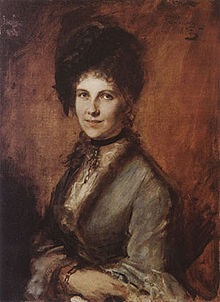Johanna von Puttkamer
Johanna Friederike Charlotte Dorothea Eleonore, Princess von Bismarck, b. von Puttkamer (born April 11, 1824 in Viartlum , Pomerania , † November 27, 1894 in Varzin ) was Otto von Bismarck's wife .
Life
Puttkamer grew up in a very pietistic Protestant home and environment. Her parents Heinrich von Puttkamer (born September 27, 1789 in Viartlum ; † November 3, 1871 in Reinfeld) and Luitgarde Agnese von Glasenapp (born October 17, 1799 in Gramenz ; † September 5, 1863 in Reinfeld) had on December 1, 1819 married in grief. The older brother Franz died at the age of five. The other brothers Johannas made careers in the Prussian state: Richard became district administrator, Bernhard became a politician, Jesco was district president, Robert von Puttkamer became Prussian interior minister.
On December 21, 1846, Otto von Bismarck asked Johanna's father for his daughter's hand in a diplomatically and rhetorically cleverly drafted letter. The wedding took place on July 28, 1847 in Reinfeld, a year later she gave birth to her first child, Marie (* August 21, 1848; † February 8, 1926; 1878 marriage to Count Kuno zu Rantzau ), and in December 1849 her second Child, Herbert , and in 1852 their third child, Wilhelm .
After the princess's death, Bismarck ordered that his companion should find her final resting place at the place of her death, where the couple had spent many summers and winters. A small summer house, which was a favorite place of the princess, was converted into a simple burial chapel, and this is where the coffin was buried. Her body was later taken to Friedrichsruh , where she is buried next to her husband in the Bismarck mausoleum .
meaning

According to the sources, Puttkamer's life was always “under the sign of the Bible”, generally the Christian faith and its teachings, and she was a member of the Evangelical Lutheran Church in Prussia . In the tendentious literary representation after her marriage to Otto von Bismarck in 1847 she was always the "loving, adoring daughter of her parents, the self-sacrificing wife of her husband and the devoted mother of her children". One might think that, taking into account the circumstances at the time, the question that arises from today's point of view, “where your life actually went”, is superfluous.
In fact, she was essential for the work and success of her husband Otto von Bismarck, as the following quotes from Bismarck from Bismarck - The White Revolutionary by Lothar Gall show:
“I don't know how I endured it before; should I live now [ 4 1 ⁄ 2 years after his wedding, i.e. approx. 1851] as I did then, without God, without you, without children - I really don't know why I shouldn't shed my life like a dirty shirt . "
Bismarck in a letter to his brother on the occasion of his wedding:
"... I believe that I have made a great and no longer hoped for happiness by, in cold blood, marrying a woman of a rare spirit and rare nobility of disposition, at the same time amiable and very vacile à vivre like I have never known a woman."
In the following years, Bismarck repeatedly referred to his wife as his "anchor on the good side of the shore" and once added: "If he breaks, God have mercy on my soul."
The social role of Bismarck's wife still deserves attention today when discussing the role of women in politics and business, even if it was not unchallenged during his lifetime: at court, for example, she rivaled Countess Schleinitz , Bismarck's wife -critical royal house minister Alexander von Schleinitz , who was not only intellectually and externally superior to her, but also effectively represented the liberal-aristocratic opposition to Bismarck as salonière and “grande dame”.
Honors
The Johannaplatz in Berlin-Grunewald is named after her.
Works
- Letters to her son Wilhelm and her sister-in-law Malwine von Arnim-Kröchlendorff geb. from Bismarck . Berlin 1924
literature
- Joachim von Kürenberg: Johanna v. Bismarck - the fate of a German woman. Keil Verlag, Berlin 1935.
- Gabriele Hoffmann: Otto von Bismarck and Johanna von Puttkamer. The story of a great love. Insel Verlag, Berlin 2014, ISBN 978-3-458-17617-6 .
- Sophie Charlotte von Sell: Prince Bismarck's wife. Publishing house Trowitzsch & Sohn, Berlin 1914.
- Ellinor von Puttkamer (editor): History of the sex v. Puttkamer (= German Family Archives . Vol. 83–85). 2nd Edition. Degener, Neustadt an der Aisch 1984, ISBN 3-7686-5064-2 , p. 362.
- Anke Weidinger: My anchor on the good side of life: The life of Johanna von Bismarck . SCM Hänssler, 2010, ISBN 3-7751-5185-0 .
Web links
- Literature by and about Johanna von Puttkamer in the catalog of the German National Library
- Works by and about Johanna von Puttkamer in the German Digital Library
- Johanna von Puttkamer on the side of the association of the von Puttkamer family
Individual evidence
- ↑ Johannaplatz. In: Street name lexicon of the Luisenstädtischer Bildungsverein (near Kaupert ) in the area around Bismarckplatz; there also Herbertstrasse named after the son.
| personal data | |
|---|---|
| SURNAME | Puttkamer, Johanna von |
| ALTERNATIVE NAMES | Bismarck, Johanna von; Bismarck, Johanna Friederike Charlotte Dorothea Eleonore von (full married name); Puttkamer, Johanna Friederike Charlotte Dorothea Eleonore von (full name at birth) |
| BRIEF DESCRIPTION | Wife of Otto von Bismarck |
| DATE OF BIRTH | April 11, 1824 |
| PLACE OF BIRTH | Viartlum |
| DATE OF DEATH | November 27, 1894 |
| Place of death | Varzin |



